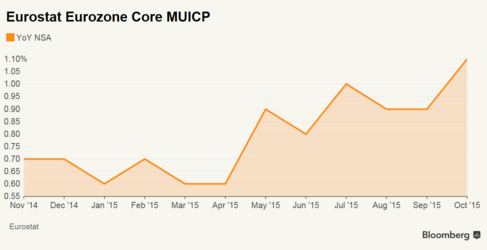-
Tips for becoming a good boxer - November 6, 2020
-
7 expert tips for making your hens night a memorable one - November 6, 2020
-
5 reasons to host your Christmas party on a cruise boat - November 6, 2020
-
What to do when you’re charged with a crime - November 6, 2020
-
Should you get one or multiple dogs? Here’s all you need to know - November 3, 2020
-
A Guide: How to Build Your Very Own Magic Mirror - February 14, 2019
-
Our Top Inspirational Baseball Stars - November 24, 2018
-
Five Tech Tools That Will Help You Turn Your Blog into a Business - November 24, 2018
-
How to Indulge on Vacation without Expanding Your Waist - November 9, 2018
-
5 Strategies for Businesses to Appeal to Today’s Increasingly Mobile-Crazed Customers - November 9, 2018
Euro zone inflation revised up to 0.1% in October
Euro zone energy costs were 8.5% lower in October than 12 months earlier.
Advertisement
Eurostat had previously estimated a zero rate of inflation in October after consumer prices in the 19 countries sharing the euro fell by 0.1 percent year-on-year in September.
Meanwhile, in the European Union (EU-28) annual inflation was 0.0 percent in October, up from -0.1 percent in September.
Economists polled by Reuters were expecting zero inflation, in line with the flash estimate, and a 0.1 percent month-on-month reading. The highest annual rates were recorded in Malta (1.6%), Belgium (1.2%), Sweden (0.9%), Austria and Portugal (both 0.7%). Month-on-month, they rose 0.2 percent in October.
Inflation is still way below the European Central Bank’s target to keep price rises just below 2 per cent. As a result, the bank is widely expected to announce further stimulus measures at its December policy meeting. In a recently released report, it was reported that the GDP in the Eurozone continued to show signs of weakness making many believe that the slowdown in China and other emerging market economies is posing huge downside risks to the economic growth trajectory of the Eurozone nations. On the other hand, the trade balance surplus widened to 20.5 billion euros in September against 17.4 billion euros previous year, as exports rose 1% while imports dropped by approximately the same amount.
Advertisement
Unprocessed food prices were 3.2% higher year-on-year, with vegetables up 9.4% and fruit 6.2% higher.





























